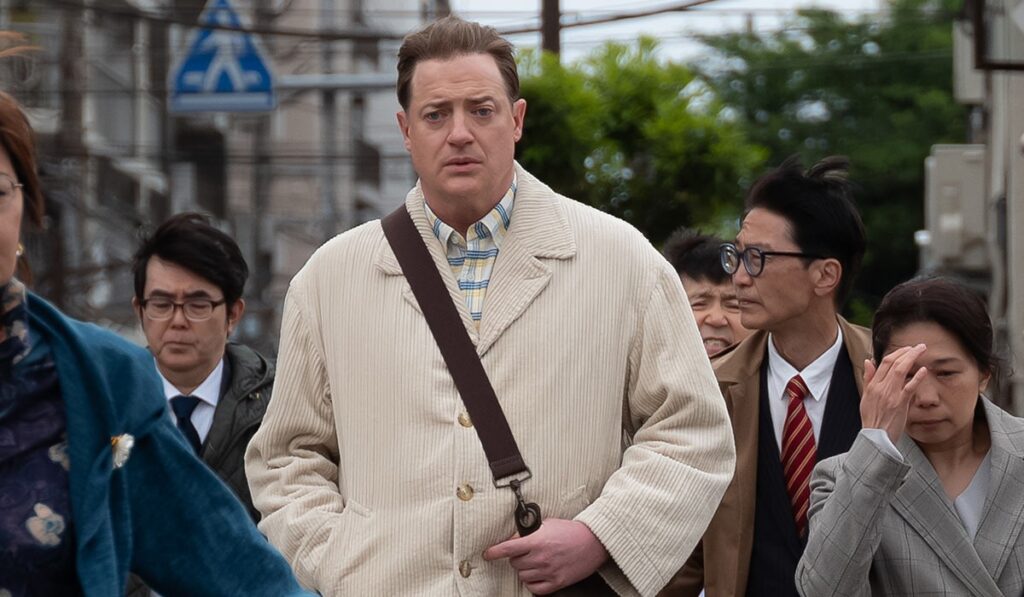In Rental Family Phillip (Brendan Fraser) is an American actor living in Tokyo who is struggling to make a living in the industry. After a successful appearance in a toothpaste commercial, acting work has dried up. He’s so desperate for work that he’s more than happy to attend a mysterious gig where he plays “sad American.”
This gig turns out to be through a unique agency called Rental Family. They provide a service where actors deliver “specialized performances” in personal role-play situations. In his first role, he plays a mourner at an open casket funeral like no other. The organization needs a “token white guy” to play a role in the real lives of others. Fake partners, video game friends, and even cheerleaders at karaoke night, you need it, Rental Family has it.
It may sound like an unusual concept, but it’s a real thing in Japan and has been since the early 1990s. Created as a way to save face in Japanese society, people can hire out dates, surrogate parents, and employees for a small fee. Phillip’s first job is to play the groom of a young woman, appease her family, and hide her true romance. When Phillip tries to quit, his co-workers Shinji (Takehiro Hira) and Aiko (Mari Yamamoto) explain the importance of their role in life.
Once Phillip gets his head around the concept of his job, he gets into the swing of things. The concept is ripe for comedic and emotional potential, and Rental Family manages to balance both. But, the film isn’t interested in laughing at the people who use the service or down-and-out Phillip. Instead, it explores the human need for connection and conversation, even if it’s not totally authentic.

A Drama About Identity Hidden In A Comedy
Rental Family centres on two key jobs that Phillip struggles to leave behind once the workday finishes. In one plot, he is hired by the daughter of a legendary Japanese actor (Akira Emoto) to play a journalist after she admits her father is feeling forgotten. Phillip is charmed and saddened by the old man, whose dementia is written with a delicate hand.
In another plot, he plays the father of 11-year-old Mia (Shannon Gorman) so her single mother can enrol her in a prestigious private school. Her mother lets her believe Phillip is her real father, wanting to make the school interview more realistic. Of course, the little girl goes through all the emotions at the introduction of her father.
In both cases, Phillip thinks with his heart and not with his head, making inappropriate choices that help the client but go uncomfortably far professionally. At no point does Fraser’s Phillip come across as anything but a good man with his heart in the right place. Rental Family never takes the easy Hollywood plotline route and always explores the morality of the roles.
Missed Opportunities
Rental Family gets caught up in Phillip’s stories so much that some of the larger picture gets ignored. The film may have benefited from exploring the unique business and stripping back another layer. Why would you start such a company, and why would you want to work on it? A montage shows the type of work Phillip’s colleagues do, but it fails to address the emotional requirements of playing rental roles within the lives of others or the perils that come with it.
The perils of the job are perfectly addressed in Aiko’s recurring roles as mistresses sent to destroy a family. Men hire her as a mistress to leave their wives, leaving the identity of the real other woman a mystery. It’s a plot thread that only gets three scenes, but an intriguing theme that needed more time.
A Gentle Dramedy That Doesn’t Take The Easy Way Out
Rental Family initially appears like a crowd-pleasing, gentle comedy about a lonely man filling in the gaps in the lives of others. The film could have so easily fallen into the trappings of being a fish-out-of-water comedy about an American learning about a new culture. As the lines between fact and fiction blur at work, the film becomes increasingly emotive without becoming overly sentimental.
It’s written by director Hikari (Beef) and Stephen Blahut. The dramedy won’t deliver any shocks, but it’s a moving exploration of humanity on different levels. The film is smart to spread its themes out over multiple stories, instead of centring on just one job. In the hands of a less confident writer/director, Rental Family would have been a sentimental comedy or a fish-out-of-water rom-com instead of a nuanced character study.

Brendan Fraser, in his first role after his Oscar win for The Whale, is ideal for the role of Phillip. Fraser is instantly likable and tender and doesn’t require unnecessary backstory to garner empathy. Fraser is also a master of physical comedy, letting those big eyes land the joke without needing to open his mouth.
Cinematographer Takuro Ishizaka understands how to use Tokyo to convey Phillip’s loneliness. At the start of the movie, the camera scans people in their apartments and the solitude of urban living. Later, as Phillips finds his purpose, the landscape changes to rural scenes, with vast forests and temples. Those with knowledge of the area may find the geographic choices a little frustrating.
Overall Thoughts
Rental Family has more layers and bite than the marketing material suggests. While it treads a well-worn road and doesn’t try to take risks, it’s an effective melodrama about cultural loneliness, authenticity, and ethics. The film is a deeper human tale of the pretending people do in daily life and how faking it is not always the best cure for loneliness.
For more Reviews, make sure to check back to That Hashtag Show.

![‘Rental Family’: Brendan Fraser Crowd-Pleasing Dramedy Has Hidden Nuance [REVIEW]](http://18.211.146.234/wp-content/uploads/2025/10/50d8d9aa-0999-474a-af7e-3cc600e4787d-1280x640.jpg)



